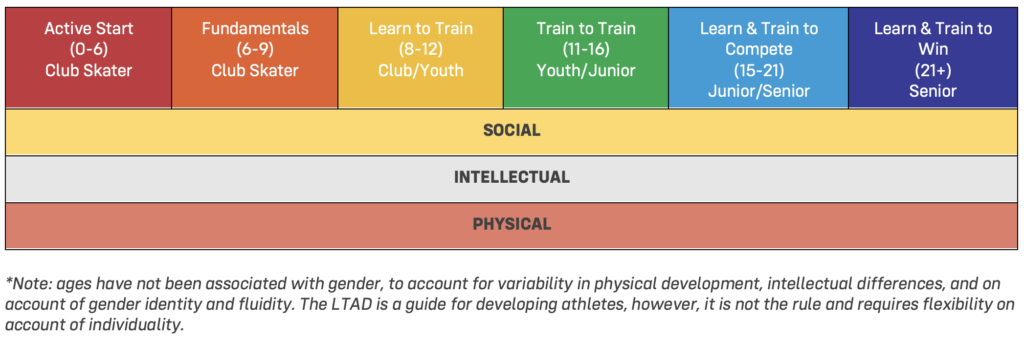ATHLETES
Whether it’s to stay fit or to reach the highest level, we’re committed to providing a fun and positive sport experience for skaters of all ages and abilities. Learn more about our initiatives to help athletes develop solid technical skills, physical fitness, and a lifelong love of skating.
BECOME A SKATER
Skating is a truly Canadian pastime and a lifelong skill that helps develop and improve one’s fitness, balance, coordination, endurance, strength, and agility. Whether you become a recreational or competitive skater, and participate in speed skating, in-line, hockey, figure skating or ringette, nothing beats the thrill of gliding across the ice on your own power.
Long Term Athlete Development
This is a guiding model will be invaluable to skaters, parents, coaches, and administrators helping to ensure that the quantity, quality, and delivery of training are appropriate for the developmental stages of the participants, including their social, intellectual, and emotional needs.
Download Speed Skating Canada’s Long Term Athlete Development model

Social
Building positive relationships between participants and coaches, will establish comfort and enjoyment within the skating environment. Creating a strong social atmosphere is critical to membership retention. To put this simply, if the participants enjoy training and competitions, on account of the relationships and fun they had together, they will want to return to the sport. By making the social aspect of sport a core feature of training and competition, we will develop a stronger social environment and promote greater membership retention.
Intellectual
All training, competitive, and recovery programs should consider the mental, cognitive, and emotional development of each skater. Along with the physical, technical, and tactical development, speed skating requires a considerable number of decision-making skills as well as strategies. Structuring a program to develop the mental, cognitive, and emotional facets is a must.
Physical
Physical training for athletes must take into consideration the sensitive periods of development.
- Stamina (Endurance): The optimal window of trainability occurs at the onset of PHV. Aerobic capacity training is recommended before skaters reach PHV. Aerobic power should be introduced progressively after the growth rate decelerates.
- Strength: The optimal window of trainability for girls is immediately after PHV or at the onset of menarche, while for boys it is 12 to 18 months after PHV.
- Speed: For boys, the first speed training window occurs between the ages of 7 and 9 years and the second window occurs between the ages of 13 to 16. For girls, the first speed training window occurs between the ages of 6 and 8 years and the second window occurs between the ages of 11 and 13 years.
- Skill: The window of optimal skill training for boys takes place between the ages of 9 and 12 and between the ages of 8 and 11 for girls
- Suppleness (Flexibility): The optimal window of trainability for suppleness in both girls and boys occurs between the ages of 6 and 10 years old. Special attention should be paid to flexibility during PHV.
Training vs Competition
Training and competition are the primary two avenues in which athletes work with a coach and group to develop their skill set to improve. Therefore, it is important to recognize these two domains and the differences which separate them.
While competition is typically the highlighted portion of the sport, training is in fact where participants spend the majority of their time engaging in sport. Elite athletes, for example, will train upwards of 260 days of the year and race 40 days of the year.
Competition calendar planning at all stages is critical to skater development. During earlier stages, developing physical capacities take precedence over competition. Throughout the later stages, the ability to compete well becomes the focus.
Stages of Development
ATHLETE RESOURCES
Courses and Workshops
Athletes are encouraged to complete online e-learning modules and courses to help them become better equipped off the ice and to ensure that they can contribute to a safe and inclusive environment within our sport.
Recognition
We have various programs in place to recognize the incredible accomplishments of Canadian speed skaters, who demonstrate an unmatched passion for our sport, work hard both on and off the ice to achieve their goals, and strive to inspire those around them.
Other Resources
Documents
Canadian speed skaters can access relevant and up-to-date documents and tools through our Resource Library, which includes:
- LTPAD Model
- Skater Development Resources
- Athlete Development Research
- Red Book
- Equipment Required
Videos
Athletes can also access a variety of speed skating videos on our YouTube channel, including competition footage, National Team profiles and the Up to Speed series, which provides tips on how to master technical skills. You’ll also find educational videos listed on our channel from partners such as the International Skating Union.
Safe Sport
Speed Skating Canada is committed to fostering a safe and inclusive environment — one free of abuse, harassment, neglect or discrimination, both on and off the ice — for athletes, coaches, officials, volunteers and administrators at all levels of our sport.
Questions
If you are looking for a resource that is not available in the Resource Library, or if you have questions about speed skating or athlete development, please reach out to us.